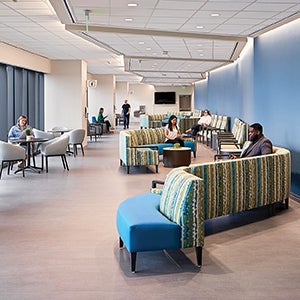Furnishings designed for the intricacies of health care
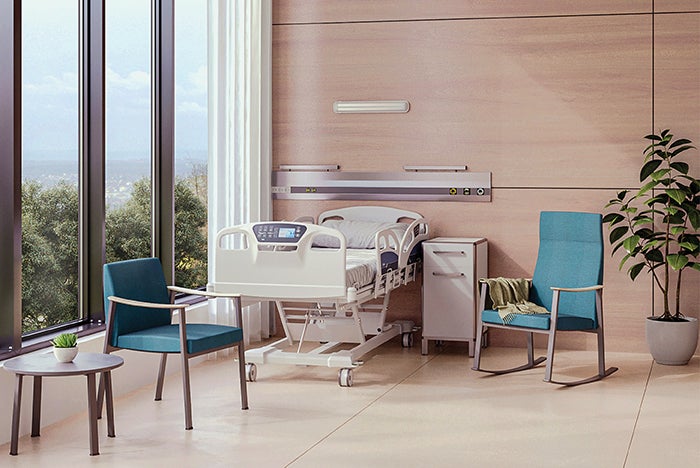
Image courtesy of Allseating
New health care furnishings feature adaptable designs, durability and cleanability as well as an emphasis on privacy. This allows hospitals to create environments that blend easy maintenance, disinfection and hygiene support — fostering a sense of calmness among patients, staff and visitors. Along with offering comfort and support, many furnishings are light and versatile enough to be quickly adjusted to meet changing demands.
“We see strong demand for prefabricated modular products and systems that give hospitals flexibility,” says Matt Sall, director for the health care product category at MillerKnoll, Zeeland, Mich. “There also is a need for inclusive and equitable spaces that are designed to accommodate everyone in a healthy, ergonomic fashion. We see an emphasis on furnishings that are high-design and high-function. Sustainability is another important part of design with more Earth-friendly materials being used, and we continue to offer such materials.”
The health care furniture industry is currently witnessing contrasting trends, according to Cesar Ferandes, product design and development manager at Stance Healthcare, Kitchener, Ontario. “On one hand, there’s a growing demand for products that prioritize cleanability and durability. Materials such as solid surfaces and steel are gaining popularity to address infection control,” says Ferandes. “On the other hand, there’s a trend favoring a more residential, hospitality-inspired aesthetic. This includes the use of wood and softer designs.”
Additionally, sustainability is becoming a bigger part of new hospital furnishings. For example, MillerKnoll is a founding member of NextWave Plastics, a consortium working to develop the first global network of ocean-bound plastic supply chains. “By integrating this transformed plastic into our products and processes, we’re reducing the volume of plastic waste,” Sall says. “You’ll see innovations and implementation of our sustainability science in many of our furniture products, with more product inclusion over time.”
Privacy options
Among the newer trends in furnishings, privacy is becoming an important consideration for health care facilities. For instance, Kimball International, Jasper, Ind., conducted research to determine the real elements that are needed to create successful hospital environments. As a result, the company discovered that a variety of spaces are necessary to provide staff and guests with privacy options. Kimball now offers the Kolo Pod, which provides accessibility to peace and quiet in an open environment.
“Kolo Pods offer a fresh perspective on private respite areas within health care spaces,” says Aneetha McLellan, regional health advisor for Kimball International. “The Anti-Eavesdrop design dampens sound, providing a quiet space for patients and their loved ones to focus in a challenging environment. The Americans with Disabilities Act-compliant model features an automatic door assist, T-shaped turnaround, and fold-down work surface and benches.” For additional visual privacy, partial-frost and full-frost privacy decals can be applied to the glass walls or doors.
KI, Green Bay, Wis., has introduced the Wiggle Room Super Structure, which is designed to create a balance between private and public spaces. This post-and-beam system makes it easy to create multi-size freestanding spaces within open-plan environments. “Wiggle Room brings balance to environments by creating an individual, distraction-free option within open offices,” says Jonathan Webb, workplace market director and leader of KI’s health care market. “Each pod is acoustically sound but can be designed to create a beautiful space that adapts to any office aesthetic.”
Cama Collection worked with Skyline Design to develop a glass screening product that provides privacy to hospitalized patients, replacing cubicle curtains. “An unintended consequence was that our biophilic patterns — Dayglow, Sunbeam and Lucent — can be integrated into design schemes as wall systems,” says Rosalyn Cama, FASID, NCIDQ, EDAC, president, Cama Inc., New Haven, Conn.
Installed in Gaylord Specialty Hospital’s Institute for Advanced Rehabilitation, Wallingford, Conn., the glass partitions create privacy while reflecting borrowed light from three-story light wells. “The environment fosters intrigue to contemplate, interact and create new modalities of rehabilitation medicine,” Cama says. “The curvilinear design breaks one’s expectation of a typical health care facility and makes one pause with gratitude to heal in a biophilic environment.” Cama, along with Pomarico Design Studio and The Project Studio, have developed a long-range plan for the facility. “The Innovation Institute is the first of many enabling projects, funded by a strong philanthropic base,” adds Cama.
Steelcase Health, Grand Rapids, Mich., offers the Kwickswitch privacy solution for health care environments. “Kwickswitch is designed to turn any glass panel into a switchable opacity pane for instant privacy,” says Pam Krill, health care marketing director. “It is certified for electrical and fire safety, offering a turnkey solution.”
Seating choices
Many other product trends revolve around seating options. For instance, MillerKnoll recently added a sensory-friendly piece to its Palisade Collection of seating products. The new chair, designed in collaboration with sensory-sensitive patients at Jefferson Health, Philadelphia, includes a textured arm cap, privacy capabilities and customizations. “The full Palisade Collection works well in lobby, waiting and patient areas, reflecting an inclusive design with a range of seat heights, widths and configurations to support caregivers, patients, families and visitors,” Sall says. “The collection also includes power outlets for convenient charging and fabric screens to break up space and provide privacy.”
Choosing seating for health care spaces means finding a solution that’s not only cleanable and safe but cost-effective as well, according to Krill. “Many seating options are practical but aren’t designed to create an inviting space for patients and their families. In contrast, Steelcase’s Radia seating collection offers a balance of function and expression. The simple design accommodates a range of spaces and body types, bringing durability to a warm and unexpected aesthetic,” says Krill.
Steelcase Health’s Radia features furniture legs that are designed to protect walls, cove molding and flooring from accidental damage. A gently curved back provides support and accommodates a variety of postures and sit-to-stand support with pommel or contour arm caps that have surfaces that can be gripped for safety. Ganging brackets allow chairs to stay together but provide the flexibility to change over time. Also, minimal seams in high-touch areas offer easy cleaning and reduced wear on upholstery.
Steelcase Health also offers the West Elm Health Collection of workplace furniture, which is designed specifically for health care environments. It features crumb-sweeps for cleanability, metal legs and upright seating postures.
Kwalu, Atlanta, offers the Casale modular seating option for hospital lobbies and other wait spaces. Casale can be connected to form extended curved sections, where multiple groups of people can sit. “The advantage to this modular seating is its flexibility. Each piece of the Casale can be separated into curved, straight and wedge units to form smaller seating groups,” says Jennifer Adams, senior vice president for Kwalu health care. Power grommets can be added to keep youngsters entertained on their devices and parents connected so they can work while they wait.
“Visitors to hospitals should feel like they are a priority,” Adams adds. “The seating should be patient-centered in its design and layout. As hospital lobbies become more than just a place for patients and visitors to wait, modular seating options have become prime real estate in this evolving space.”
The Rühe seating collection from Allseating, Mississauga, Ontario, includes guest, patient and lounge seating with various table options. Rühe emphasizes a residential feel and ensures health, durability and easy cleaning, according to Cindy Lawton-Moreby, vice president of sales. The collection features a 14-gauge steel frame, seven support ladders, extended arm caps and soft cleanouts between seats across 15 standard seating configurations.
During the past year, the Rühe collection received a Level 3 certification for sustainability. “The Level certification is a voluntary standard that establishes measurable performance criteria to provide information on indoor air quality, material composition, issues related to life cycle assessments, social responsibility and ecosystem impacts,” Lawton-Moreby says. Allseating also became a Greenhealth-approved supplier in 2023.
KI offers the Sonrisa Lounge small-scale collection of chairs, loveseats, benches and ottomans that feature a soft, rounded design. “Sleek in design, this product comes with design flexibility as well as contrasting fabric options and several thread colors,” says Webb.
Stance Healthcare has introduced the Rise adjustable dining room table, which is designed to meet the needs of health care and senior living facilities. The table features a 7-inch height adjustment capability so individuals can customize its height to their desired comfort level. A paddle activation mechanism ensures smooth adjustments, accommodating users of all abilities. In addition, the table's X-base is equipped with adjustable nylon glides, providing stability on various surfaces. Its frame incorporates a 5-inch diameter and 3-foot, 6-inch telescoping steel column, which provides stability and strength.
Midmark Corp., Buffalo Grove, Ill., has introduced the 626 Barrier-Free examination chair. It allows patients to sit with their feet flat on the floor and their backs supported while rails support their arms at heart-height during blood pressure acquisition. The Midmark digital vital signs device provides automated blood pressure, temperature, oxygen saturation and pulse rate readings at the touch of a screen. It seamlessly integrates with the electronic health record, allowing caregivers to access and update patient data at the point of care.
“Hospital furniture, such as exam chairs, should be designed for clinical environments and for easy cleaning and disinfecting underneath,” says Tracy Timmerman, senior marketing manager. “Features such as antimicrobial pulls, non-porous surfaces and seamless upholstery are the key to reducing infection vulnerabilities.”
Fabric selections
Fabric is another area that is seeing innovation. The health care field is moving toward creating spaces that feature hospitality aesthetics — comforting, inviting and sophisticated — incorporating lots of texture, according to Mary Holt, chief design strategist at Carnegie, Rockville Centre, N.Y., a manufacturer of upholstery, wall coverings and acoustical management solutions. “While the beauty of the design has a lot to do with choices, we see more designers interested in products that uphold a standard of performance, such as materials that are bleach-cleanable and wipeable.”
Tone, part of Carnegie’s Endeavor Collection, draws inspiration from traditional Japanese ikats and is a bleach-cleanable performance fabric. “Multiple solution-dyed yarns commingle, blurring the boundaries of color to create an organic and balanced plaid,” Holt says. Made from 100% post-consumer plastic bottles, Tone is 100% PVC- and PFAS-free and durable enough to withstand high-traffic environments. “As a Healthy Hospital Initiative-compliant upholstery, Tone facilitates an organic connection between the functional needs of a space, its intended purpose and its real-world application,” adds Holt.
In 2023, Ultrafabrics, Tarrytown, N.Y., a manufacturer of high-performance furniture fabrics, re-launched its flagship Promessa collection, adding new colors and a recycled polyester backcloth made of eight plastic bottles per yard. In response to feedback in the health care field, it removed all antimicrobial additives.
“We are seeing a movement in hospitals to get rid of antimicrobial finishes in textile choices. However, clients do not want to sacrifice sensorial aesthetics, quality or performance,” says Chris Rogers, business development manager for health care at Ultrafabrics. “Sustainability also is a concern. Across a broader landscape, we are seeing products that incorporate organic materials such as chitosan (crushed seashells) and other natural options.”
Looking ahead
Manufacturers of hospital furnishings say they will continue to prioritize ergonomic design to ensure comfort and support for patients and caregivers. This will include adjustable features that accommodate individual needs and promote proper posture.
Furnishings also will continue to incorporate materials that are easy to clean and resistant to bacteria and viruses. Additionally, more furnishings will incorporate smart features to enhance functionality and convenience.
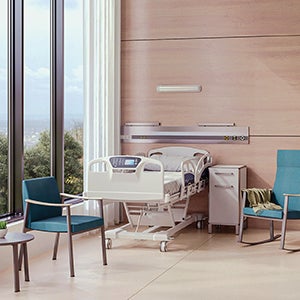
SEATING FOR ALL
The Ruhe seating collection includes guest, patient and lounge seating with various table options. Allseating
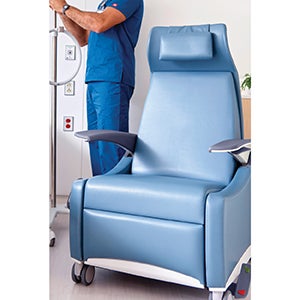
ULTRA-FUNCTIONAL
The Ultraleather on the OFS Lasata Chair features high-quality haptics, color and performance. Ultrafabrics
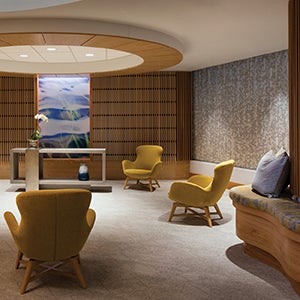
DEEP DIVE
TSkyline Design Cama Dayglow glass (on right-hand wall) serves as a translucent feature wall panel, creating a confluence of sensory emersion. Cama Inc.
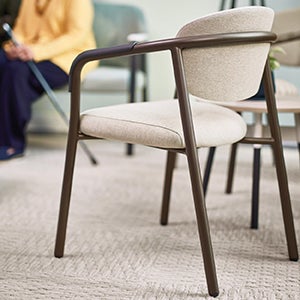
READY FOR ALL
Radia seating has a simple design that accommodates a range of spaces and body types. Steelcase Health
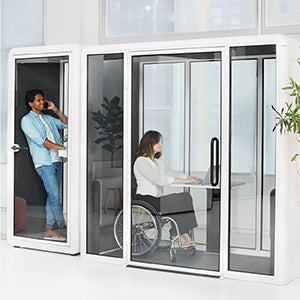
PRIVATE ROOM
The Americans with Disabilities Act-compliant Kolo Pod features fold-down work surfaces and benches so that privacy is accessible to all. Kimball International
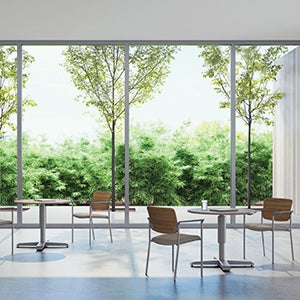
RISE UP
The Rise adjustable dining room table features a 7-inch height adjustment capability. Stance Healthcare
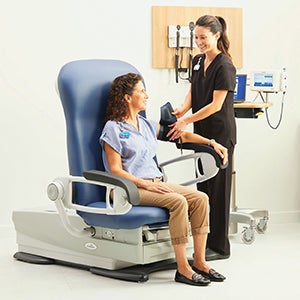
NO LIMITS
The 626 Barrier-Free examination chair allows patients to sit with their feet flat on the floor and their backs supported. Midmark Corp.
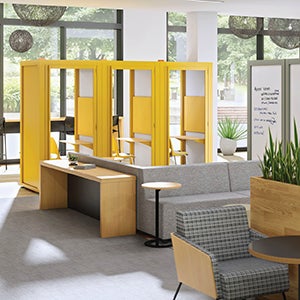
THE RIGHT BALANCE
The Wiggle Room Super Structure is designed to create a balance between private and public spaces. KI
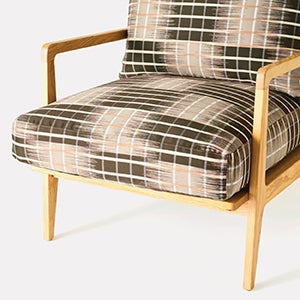
TOUGH ENOUGH
Tone bleach-cleanable performance fabric is durable enough to withstand high-traffic environments. Carnegie
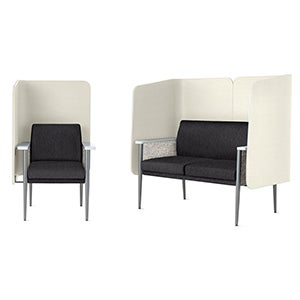
GOOD FEELING
The Nemschoff Palisade Collection includes sensory-friendly seating, which features a tactile arm cap for sensory input. MillerKnoll
Neal Lorenzi is a Mundelein, Ill.-based contributor to Health Facilities Management.


